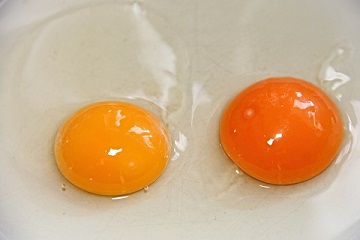Hen’s diet can hugely impact the quality and nutritional value of the eggs she lays? Poultry farmers are mostly rely on nutritionists and feed experts to ensure that hens receive balanced diets with precise amounts of vitamins, minerals and macro-nutrients required for their life stage.
A common misconception is that shell color influences an egg’s flavor, quality or nutritional value. Brown eggs and white eggs that are laid by hens who are consuming the same feed ration will contain the same essential nutrients – the only factor that determines the color of an egg is the color of the hen’s feathers and earlobes.
Egg yolks get their yellow color from corn, or other ingredients, mixed into the hen’s diet. Hens transfer yellow xanthophyll pigments from the ingredient into the egg yolk, which gives them a rich yellow or gold color. If a hen is fed a ration made with white corn or wheat that doesn’t contain yellow pigments, she will lay eggs with yolks that are pale yellow in color. The color of the yolk is not an indicator of nutritional value. When a hen’s diet is supplemented with special nutrients, the eggs she produces will often include higher levels of that specific nutrient. The ingredients egg farmers use in its feeds are always safe for flocks to eat and often mutually beneficial for hen health and egg nutrition.
Now we can discuss few nutrients and ingredients that are commonly mixed into feed rations to ensure the hens are healthy and laying nutritious and high-quality eggs:
1. Calcium: Egg-laying chickens require a high level of calcium in their diet so they can produce strong eggshells. The amount of calcium a hen needs depends on her age and production rate. For example, pullets (young hens) that aren’t yet laying eggs don’t need as much calcium as a hen that’s in peak production and is laying an egg nearly every day.
2. Protein: It’s especially important for pullets to have an increased level of protein supplemented in their diet as they’re growing and building the foundation to become productive laying hens. As hens age, their level of needed protein decreases but remains an essential nutrient for egg-laying hens to support strong shells and steady egg production.
3. Vitamins and minerals: Whether naturally found in the crops included in feed rations, like corn, soybeans or wheat, or added manually as a supplement, vitamins and minerals promote steady egg production and strong shells. Some are passed easily from the hen to the egg during lay. For example, Vitamin D, used to support strong shell development, is transferred directly to the egg and into your diet.
Poultry farmers understand that egg quality starts with hen health and nutrition and take that responsibility seriously. Above all, the primary focus of a poultry farm’s nutrition program is ensuring its flocks are receiving the nutrients they need to live healthy lives, while producing safe, nutritious eggs for consumers.
